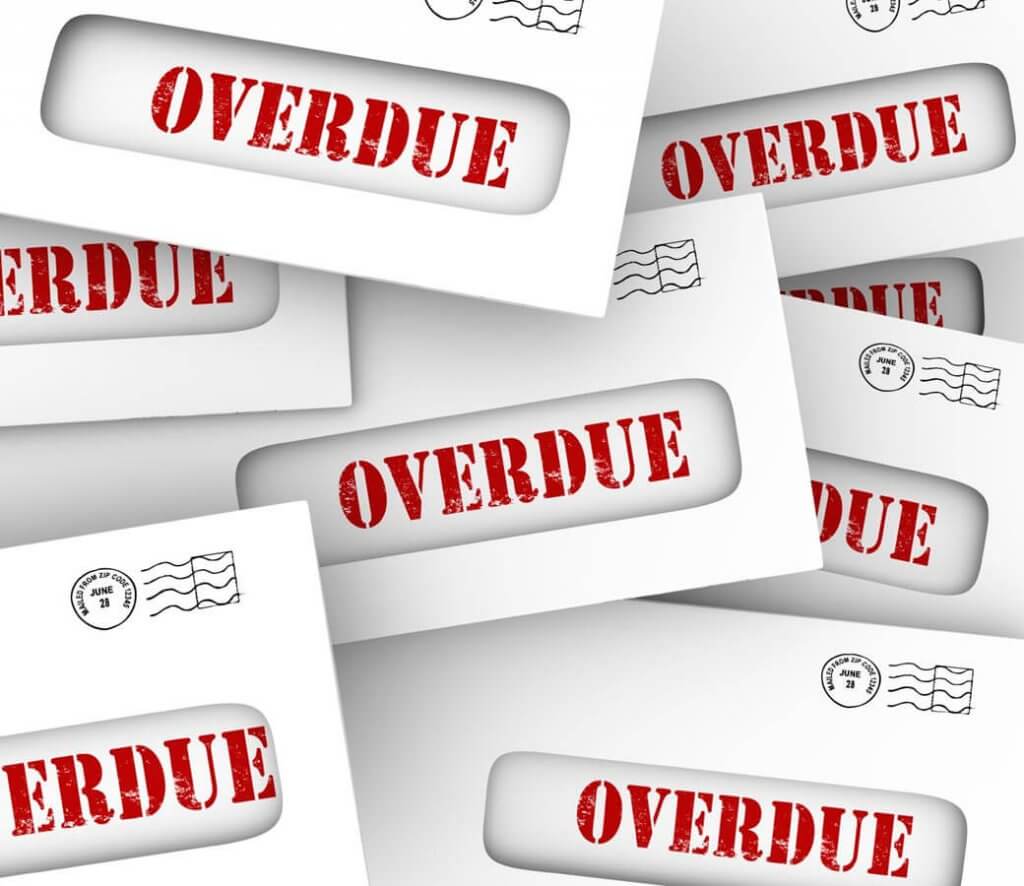Whether it’s from forgetfulness or sheer lack of funds missed credit card payments can affect your finances more than you may think.
Each week, Consolidated Credit searches for financial research that can help you deal with your debt and budget. This week…

Two surveys came out recently that investigate how likely credit card users are to miss a payment. The first survey from NerdWallet polled 2,000 people to find out how many had made a delinquent payment. The second survey from CreditCards.com polled 1,000 adults to ask the same type of question.
The big result
In NerdWallet’s survey, nearly one in four respondents (22.4%) admitted they had missed a payment by more than 30 days. CreditCards.com’s found that 42% of cardholders they polled had missed at least one payment.
That’s concerning because climbing delinquency rates could spell trouble for the economy. Credit card delinquency rates from missed payments hit an all-time high of 6.7% in 2009 at the height of the Great Recession. Then the national delinquency rate fell to its lowest point in 2015 at 2.12%. But now it’s climbing again as more cardholders miss payments.
What’s more, that national rate from the federal reserve can be deceiving. It looks at all the population, and not just credit card users. If you only look at credit cardholders, delinquency rates are higher. In Nevada, for instance, one in ten cardholders has at least some missed payments.
The fascinating details
The CreditCards.com survey explored who was most likely to miss a payment.
- Women were more likely to miss a payment than men (48% vs 35%)
- Oddly, employed cardholders were more likely to miss payments than unemployed cardholders (46% vs 34%)
But beyond the demographics, what’s even more concerning were the reasons why payments were missed. Both surveys explored why cardholders hadn’t made their payment. And the responses were slightly shocking:
- On CreditCards.com:
- 60% forgot they needed to make a payment
- 35% didn’t have enough funds to make the payment
- 13% were too busy to pay
- 11% were traveling
- On NerdWallet:
- 35% forgot to pay
- 33% used the funds to cover other essentials
- 32% had an unexpected emergency
What you can do
“What concerns me is the number of people who say they’ve missed payments because they forgot or were too busy,” says Gary Herman, President of Consolidated Credit. “Missed payments can have a significant impact on your credit score. And even aside from that, late fees can stack up quickly. You’re not doing yourself any favors by missing payments. It’s unfortunate if someone is forced to miss a payment due to their financial circumstances. But missing payments for any other reason is just irresponsible, especially given all the tools that are available that can help you pay on time.”
Defining delinquent payments
A missed payment – also known as a delinquent payment – is any payment missed by more than 30 days. If you make the payment prior to 30 days from the original due date, the payment is late, but not missed.
The effects of late and missed payments

Creditors report missed payments to the credit bureaus. That means that the delinquency appears in the payment history of your account. Credit history accounts for 35% of credit score calculations – it’s the single biggest factor in determining your credit score. Just one missed payment can drop your score by as much as 110 points, according to Chase.
But even before a payment is officially missed, the financial consequences of not paying on time can be steep. The maximum fee for a late payment is $27 – but that cap only applies if you’re a first-time offender. Otherwise, late fees can be higher.
“A late payment costs money upfront,” Herman explains, “But once the payment is fully delinquent by 30 days or more, the cost is even higher. A 90-point drop in your credit score will significantly damage your borrowing power. Every loan and credit card you get afterward will have higher interest rates. That means higher monthly payments and more interest charges to pay each month. A missed payment can start a slow spiral into financial hardship.”
Keep in mind that the impact of missed payments increases with each month that passes. Creditors report missed payments at 30, 60, 90, 120, 150 and 180 days. So, the damage to your score increases with each month that passes. After 60 days of nonpayment, most creditors also apply penalty APR, which can be double your normal interest rate. Once penalty APR applies, you must make six consecutive payments on time before the creditor will restore the original rate.
If the payment is more than six months late, the creditor charges off the account and sends it to collections.
Tips for avoiding missed payments
“For anyone that’s missing payments because you’re forgetful, busy or traveling, AutoPay or Direct Debit are the tools for you,” Herman says. “You can set up AutoPay through your credit card account. Or you can set up a recurring Direct Debit ACH payment through your checking account. Both of these options will help ensure you never miss another payment.”
AutoPay and Direct Debit are slightly different tools, although they both accomplish the same thing:
- With AutoPay set up through the account, you can choose how you want to pay every month. You can usually set it to make the minimum payment, to pay the balance off in full or to pay an amount you set. Ideally, paying off the balance in full every month is the best option, because it allows you to use a credit card account interest-free.
- Setting up recurring payments using Direct Debit through your bank account usually works best if you’re already carrying a balance. You can set a fixed amount each month so you can pay down your balance faster with the biggest payments you can afford. Otherwise, using Direct Debit means you must remember to make the payment since credit card payments can change every month.
“You can also set up bill payment reminders, either through your credit card account or through any budgeting tool that comes with a bill pay calendar,” Herman continues. “Budgeting tools like Mint sync with your credit card accounts and send bill pay reminders automatically. This can help you avoid missing a payment because you’ve been too busy.”
What to do if you don’t have the funds

“Missed payments due to lack of funds or unexpected expenses are a different matter,” Herman says. “In this case, tools like AutoPay and recurring Direct Debit payments can hurt instead of help. If you don’t have the funds in your account, you can incur NSF (non-sufficient funds) fees, in addition to late fees. Instead, you need to find a solution that can provide debt relief, so you can balance your budget and start to get ahead.”
Herman says that the first step when you’re struggling to make your payments should be to call your creditors.
“Don’t treat your creditors like collectors if you’re having trouble,” he explains. “If you call them before you start to fall behind, they’re often willing to work with you. They may even help you set up a payment plan you can afford or pause your payments until your situation improves. Credit card companies don’t want your accounts to become delinquent, because that’s not good for their bottom line either. So, it’s often worth the call to see if they’re willing to work with you to make arrangements.”
If your creditors won’t play ball, then it’s time to call a credit counselor. A certified consumer credit counselor can help you explore options for debt relief, such as debt consolidation. If you can’t qualify for do-it-yourself options because you don’t have the best credit score, then the counselor may recommend a debt management program.
“What people often don’t realize is that many of these debt relief solutions can actually help you balance your budget, too,” Herman encourages. “Because these solutions usually focus on paying off debt at the lowest interest rate possible, it makes repayment more efficient. You lower the rates applied to your debts, you can get out of debt faster, even though you may pay less each month.”